A Year of Demonic Public Service: The Fallible Fiend by L. Sprague de Camp
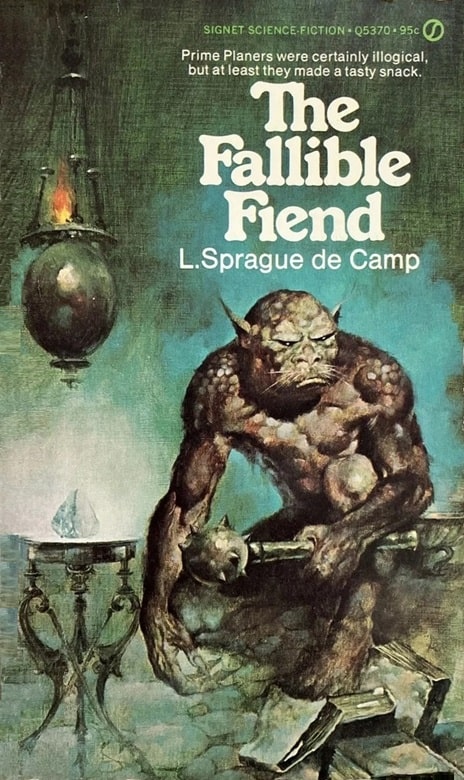 |
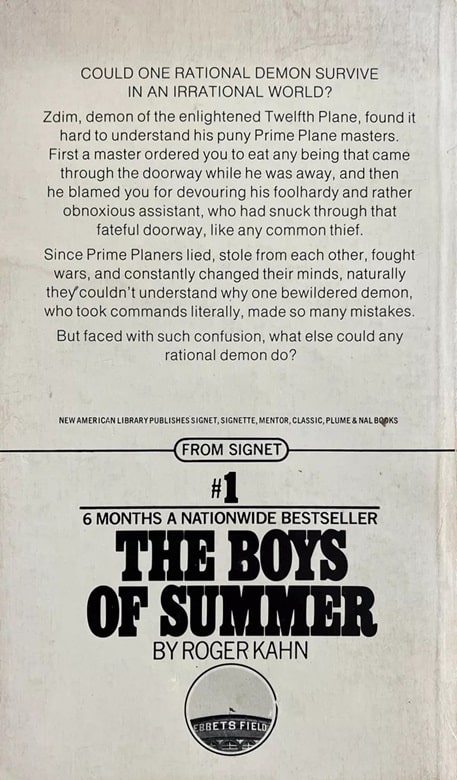 |
The Fallible Fiend (Signet/New American Library, February 1973). Cover uncredited
This is another in my series of looks at fairly obscure SF from the ’70s and ’80s. In this case, I rescued a book that I had bought used decades ago from the chaos of my bookshelves. Most of the other writers I’ve discussed so far have been somewhat forgotten (or were never really known at all) but L. Sprague de Camp is an SFWA Grand Master, and a writer I and many others remember with great affection.
De Camp (1907-2000) began publishing SF in 1937 with “The Isolingual,” and was from the beginning a popular and prolific writer. He wrote both Fantasy and Science Fiction, though by the end of his long career the bulk of his work was Fantasy. His preferred mode was lightly cynical humor — this imbued his SF such as the Viagens Interplanetarias series, and his Fantasy beginning with his Incomplete Enchanter stories written with Fletcher Pratt.
[Click the images for public service versions.]
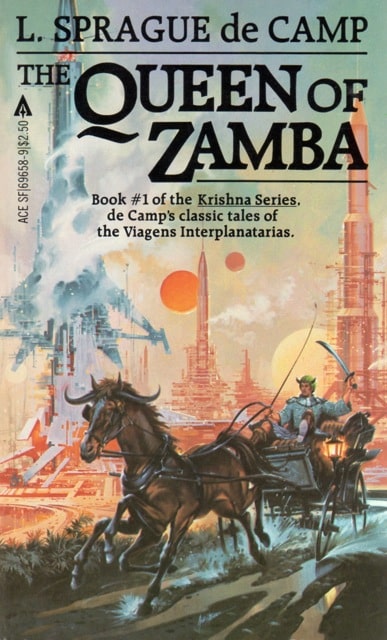 |
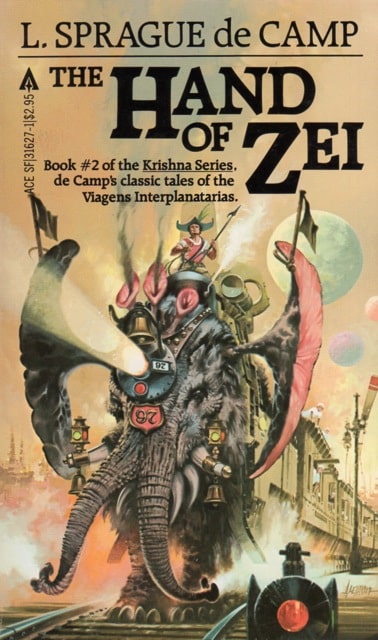 |
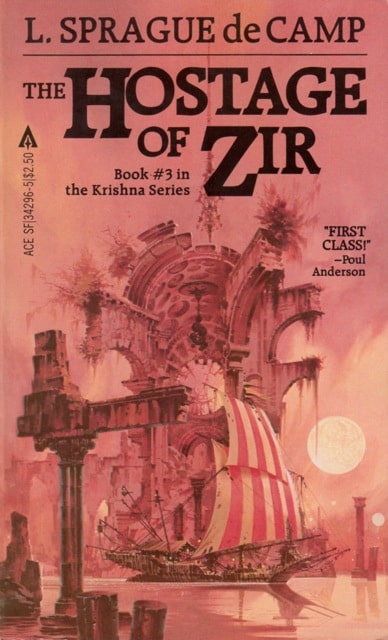 |
The first three novels in Viagens Interplanetarias, called the Krishna Series
in this edition: The Queen of Zamba, The Hand of Zei, and The Hostage of Zir
(Ace Books, May, August & November 1982). Covers by Paul Alexander
Mentioning his collaborator Pratt hints at another notable feature of his oeuvre — he was one of the most enthusiastic collaborators in SF history. He collaborated extensively with Pratt, and with Lin Carter, and with his wife Catherine Crook de Camp. (His collaborations with Carter were mostly Conan stories, often billed as posthumous collaborations with Robert E. Howard.) His first novel was a collaboration with H. L. Gold, and another early novel was a collaboration with P. Schuyler Miller.
De Camp also wrote a great deal of nonfiction. Lands Beyond, a collaboration with Willy Ley, won the 1954 International Fantasy Award for nonfiction. The Science Fiction Handbook (written with his wife) was an important early “How To” book about writing and marketing SF. He wrote biographies of H. P. Lovecraft and Robert E. Howard, as well as a lot of popular science, and an autobiography, Time and Chance.
All that is wonderful, and a portrait of a worthy Grand Master. But what about the book at hand?
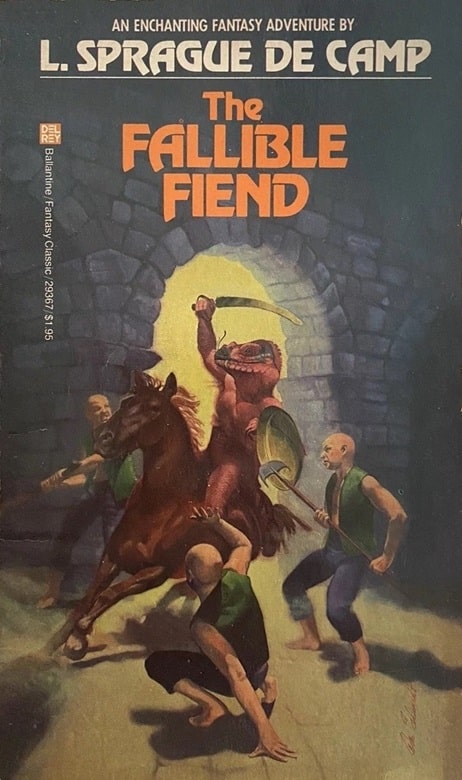 |
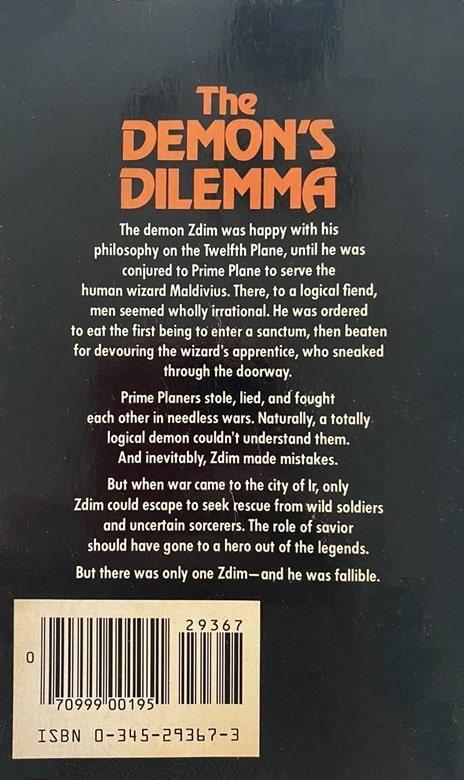 |
The Fallible Fiend (Del Rey Books, May 1981). Cover by Bill Schmidt
The Fallible Fiend (1973) is one of five novels sharing a setting: the isthmus or peninsula of Novaria, which joins the two major continents in what seems a parallel world to ours, in which magic works. Novaria has multiple different polities, and there are other such nations on the two continents — all of which seem to bear some relationship to historical regions or states in our history. The primary purpose of all this is satirical commentary. The Fallible Fiend, though the fourth novel to be published, is the earliest in interior chronology (though there is an earlier short story.)
It’s also different in that the title character comes from a separate plane, the Twelfth Plane, and is a literal man-eating demon. He also serves as an outsider narrator who can (and does) comment satirically on the doings of people in the so-called Prime Plane. His name is Zdim, and he is doing a sort of public service for his demonic state — allowing himself to be summoned for a period of one year (in exchange for iron, which is rare on the Twelfth Plane.)
Inside cover of The Fallible Fiend (1973 Signet edition)
The novel, then, tells of Zdim’s experiences over that period of service. He begins working for Doctor Maldivius, who had summoned him. After an unfortunate event (eating the Doctor’s apprentice) he ends up being sold to Bagardo, who runs a circus. This doesn’t end well, though he befriends an ape-man who is a slave.
He is transferred to a rich widow, Madame Roska. And before long he finds himself traveling again, to the mountains to recruit help in the defense against a group of cannibals, the Paaluans, who are invading. Much of the rest of the novel involves the progress of that war, which is recounted in the same cynical but amusing manner as what went before.
It’s a light novel, and often enough enjoyable, but it never really rises beyond that. I didn’t mind reading it, but I was never enthralled. And so I was surprised to learn that it won the 1973 British Fantasy Award for Best Short Story (which meant anything shorter than a novel.)
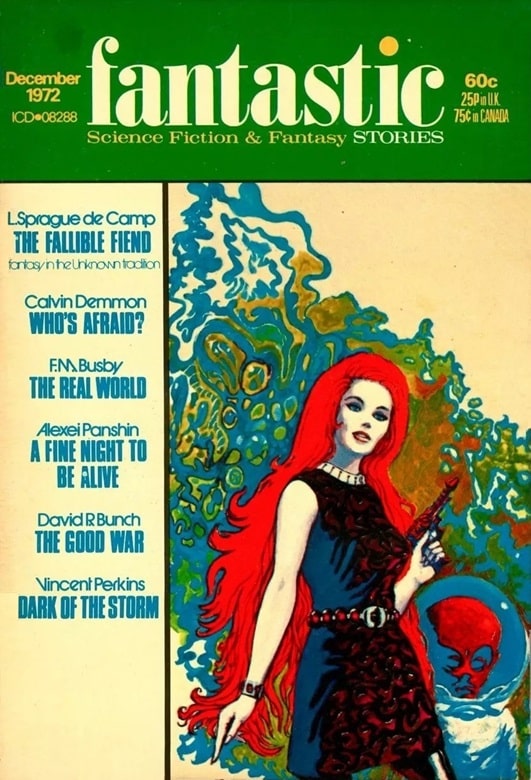 |
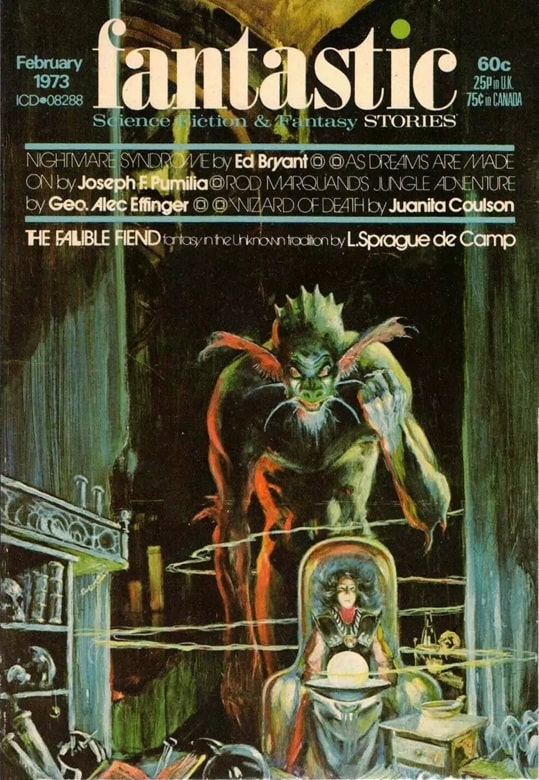 |
Fantastic, December 1972 and February 1973, containing
The Fallible Fiend. Covers by Douglas Chaffee and Michael Kaluta
My surprise was based partly on quality — surely there were better Fantasy short stories that year! — and partly on length — The Fallible Fiend is definitely a novel, albeit a fairly short one.
Some suggested that the award was to the original serialization, in Fantastic for December 1972 and February 1973, but as far as I can tell that version is pretty much the same as the book version — definitely novel length, at least by the Hugo and Nebula definitions. (Over 40,000 words.)
Rich Horton’s last article for us was a review of Vinyl Wonderland by Mark Rigney. His website is Strange at Ecbatan. Rich has written over 200 articles for Black Gate, see them all here.
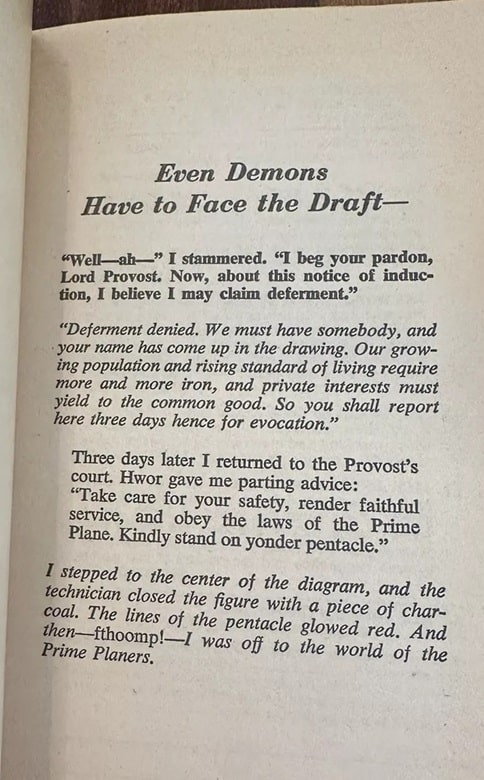
I’ve never been able to work up much enthusiasm for de Camp’s solo efforts. After reading the Queen of Zamba, I felt no desire to read any of the other Viagens Interplanetarias books. The Tritonian Ring struck me as utterly lightweight. I suppose Lest Darkness Fall is the best thing of his I’ve read, and I would rate it as no more than a fun idea competently executed – not exactly a ringing endorsement!
It just seems to me that everything he did was, as I said, essentially lightweight (like he couldn’t work up much enthusiasm for these books himself, though maybe “lightweight” was all he was aiming for). He was clearly an intelligent, knowledgeable, and inventive man, but it feels like he did so much of this work with only half of his attention, half of his ability. It’s usually good enough to result in something readable and mildly amusing, but no more.
Maybe that’s why his work with Fletcher Pratt is more satisfactory (to me, anyway) – Pratt supplied de Camp’s “missing half.”
I tend to award Mr. de Camp some points for Lest Darkness Fall as he was rather historically correct in showing the “reconquering” Byzantines to be the villains as opposed to the less-appreciated occupying Goths. You really did not want to be there when Justinian’s tax agents showed up for collections.
I must agree with you, Mr. Parker. I find the works co-authored by Pratt & de Camp to be much more to my liking than either writer working alone. Lightweight is good description of de Camp’s solo writing, in my opinion.
Thank you for the post, Mr. Horton!
I’ve enjoyed many of de Camp’s novels and stories. Fantasy and sword 7 planet stuff. I didn’t care for the Conan stuff he and Lin Carter wrote.
I will say this about the de Camp and Carter Conan stuff – while it clearly wasn’t anywhere near the quality of its model, it did the considerable service of keeping the character in the public consciousness (and introduced him to people who had no familiarity with Howard’s original stories) until the pure, unadulterated item became more widely available. For that, de Camp and Carter deserve thanks. (I feel the same way about the often maligned August Derleth and his efforts on behalf of Lovecraft.)
I can’t argue with that, but I must say that the “Conan as an old guy” novelette I read recently, “The Witch of the Mists” (Fantastic, August 1972) was godawful. The prose was dreadful too, leading me to think that Carter must have done the actual writing.
I can beat that pain – I read the solo de Camp Conan novel, Conan and the Spider God (done for Bantam, I think) not once but twice, and it wasn’t worth reading the first time. Halfway through the second go-round, I thought, “haven’t I read this damn thing before?” I went ahead and finished it because I’m stubborn and stupid. One of these days I’m going to read the one Poul Anderson wrote for that series (Conan the Rebel?). I mean, c’mon – Poul Anderson! He had to do a more than respectable job – which the Spider God definitely wasn’t.
These days if I read de Camp, it’s much more likely to be his nofiction — Lost Continents, Great Cities of the Ancient World, or maybe The Ancient Engineers and its companion volume, etc.
Purchased Great Cities of the Ancient World after reading this post; quite enjoying it so far, very informative and wide-ranging. De Camp wrote fiction, but comes across as more comfortable working in colorful, anecdotal non-fiction, I think…
I loved The Goblin Tower trilogy, and I think I read The Honorable Barbarian (which obviously didn’t land as well for me). Did not know this one existed.
I tend to enjoy de Camp’s later light fantasies, just not to love them. They are, to my mind, yard goods, but stylish yard goods. I haven’t read The Goblin Tower trilogy though.
Rich, I think this comment of yours sums up all of de Camp’s fiction for me: “It’s . . . often enough enjoyable, but it never really rises beyond that. I didn’t mind reading it, but I was never enthralled.” I think de Camp’s value and thus legacy will be tied to his bringing REH back into print and his non-fiction. Though he is a fallible historian as well, he is at least enthusiastic about what he writes and gets the reader excited about it as well.